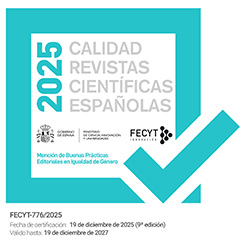Silence, Abuse, and Madness: Picasso in Jeanette Winterson's Art & Lies
DOI:
https://doi.org/10.17561/grove.v30.8008Keywords:
Art & Lies, Pablo Picasso, Jeanette Winterson, female silence, gender studies, contemporary literatureAbstract
In Art & Lies (1994), Jeanette Winterson presents three characters who are alter egos of Handel, Picasso, and Sappho. This article focusses on Picasso as an alter ego not only of Pablo Picasso but also of the character itself, whose birth name is Sophia, and of Pablo Picasso’s lovers, who were silenced, abused, and driven to madness like Winterson’s Picasso. The main aspects taken into account are the fact that the character is silenced by her family and that she is sexually abused by her brother in order to understand that her journey towards becoming the madwoman in the attic is induced by the harmful context that she is surrounded by in the same way that occurred to Pablo Picasso’s lovers and to Bertha Mason in Jane Eyre.
Downloads
References
Brontë, Charlotte. Jane Eyre. Wordsworth Classics, 1999.
Gilbert, Sandra M., and Susan Gubar. The Madwoman in the Attic: The Woman Writer and the Nineteenth Century Imagination. Yale University Press, 1979.
Gilot, Françoise, and Carlton Lake. Life with Picasso. McGraw-Hill, 1964.
Huffington, Arianna Stassinopoulos. Picasso: Creator and Destroyer. Simon and Schuster, 1988.
Picasso, Marina. Picasso, My Grandfather. Translated by Catherine Temerson. Riverhead Books, 2001.
Picasso, Pablo. Picasso. Forty Years of his Art. Ed. Alfred H. Barr, Jr. The Museum of Modern Art, 1939.
Ward, Ian. “The Rochester Wives.” Law and Humanities, vol. 2, no. 1, 2008, pp. 99-130. https://doi.org/10.1080/17521483.2008.11423744
Winterson, Jeanette. Art & Lies. Vintage, 2014.
Published
Issue
Section
License
Copyright (c) 2023 Claudia Martori

This work is licensed under a Creative Commons Attribution 4.0 International License.
Authors who publish with this journal agree to retain copyright and grant the journal right of first publication with the work simultaneously licensed under a Creative Commons Attribution License that allows others to share the work with an acknowledgement of the work's authorship and initial publication in this journal. Also, authors will retain the rights on their work, even if they will be granting The Grove. Working Papers on English Studies a non-exclusive right of use to reproduce, edit, distribute, publicly communicate and show their work. Therefore, authors are free to engage in additional, independent contracts for non-exclusive distribution of the works published in this journal (such as uploading them to an institutional repository or publishing them in a book), as long as the fact that the manuscripts were first published in this journal is acknowledged.

























